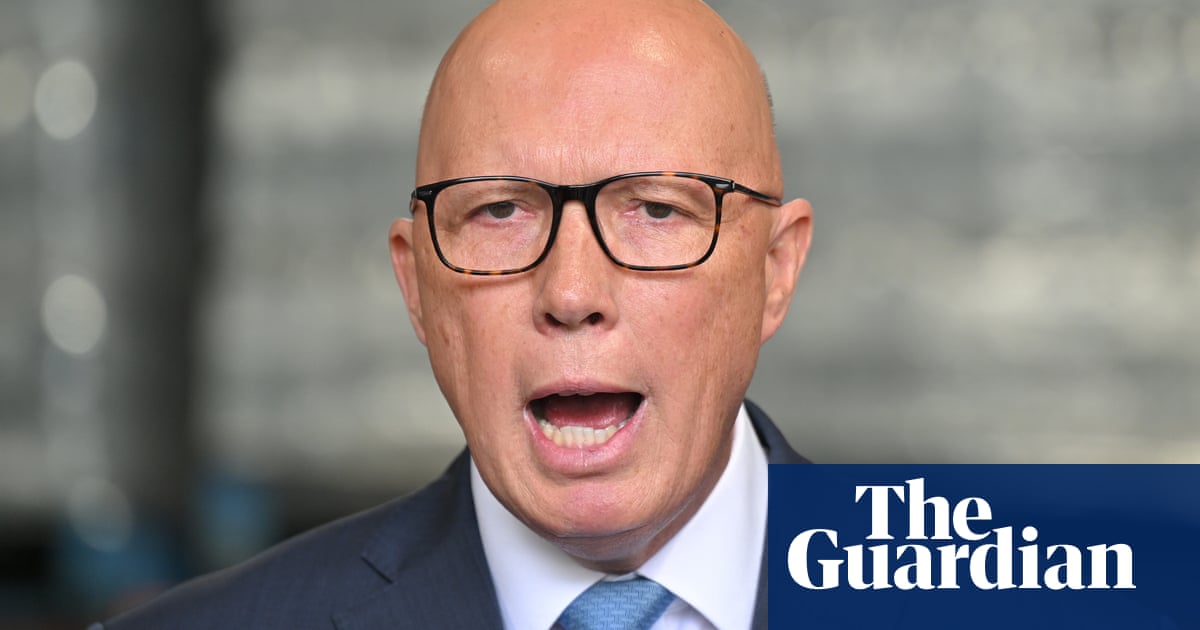Peter Dutton has confirmed he does not believe welcome to country ceremonies are necessary at Anzac Day dawn services and on commercial flights, continuing to stoke a culture war in the final week of the election campaign.
It comes days after a neo-Nazi booed and heckled a welcome to country ceremony at a dawn service in Melbourne.
On Monday, Dutton again condemned those extremist protests, saying Anzac Day ceremonies were “sacred” and not a place for booing, but repeatedcomments from Sunday night’s televised debatethat Indigenous acknowledgments were “over the top”.
In an at-times testy press conference in the NSW central coast seat of Paterson – a key Liberal target – Dutton said “significant events” like opening of parliament were appropriate for a welcome to country, but downplayed the need in other areas.
Asked about Qantas’ practice of giving acknowledgment of country where their planes land, Dutton dubbed it “over the top”. The airline was contacted for comment.
During his press conference, pressed on whetherAnzac Dayceremonies warranted a welcome to country, Dutton replied: “No, would be my answer to that.
“It’s ultimately a decision for the individual organisers at the events, and they can make a decision based on their membership and what their board wants to do, and that’s a decision for them, and I respect that,” Dutton said.
“Anzac Day is about our veterans … I think if you are listening to their sentiment, and we are respectful of that sentiment on Anzac Day, I think the majority view would be that they don’t want it on that day. But I think it is an individual decision for the RSLs.”
Sign up for the Afternoon Update: Election 2025 email newsletter
Dutton did not say how his view about the “majority” of veterans was formed. Several media organisations have referred to an online survey run by news.com.au, which was an unscientific and unrepresentative opt-in poll, which found 65% of 50,000 respondents wanted Welcomes to Country to end completely and another 23% said they wanted fewer welcomes.
On 15 April, the Cairns RSL sub branch asked the local state MP, Michael Healy, not to acknowledge country in his speech at a dawn service.
“In defence to [sic] our members’ wishes, we respectfully request that you refrain from including the welcome to country in your speech at our Anzac Day dawn service,” said an email seen by Guardian Australia.
The Queensland RSL was contacted for comment. It is not known whether Healy was asked not to provide a welcome to country acknowledgment as one had been delivered earlier in the service. Healy has also been contacted for comment.
When contacted for a response to Dutton’s remarks, the national RSL referred Guardian Australia to a website providing advice on hosting an Anzac Day service, which includes a “welcome including acknowledgment of country”. The Victorian branch of the RSL was also contacted for comment.
Sign up toAfternoon Update: Election 2025
Our Australian afternoon update breaks down the key election campaign stories of the day, telling you what’s happening and why it matters
after newsletter promotion
Labor cabinet minister Jason Clare told Sunrise on Monday morning that he hoped the issue would not become a political football in the final days of the election.
“Remember where all of this began on Friday. It spawned out of the actions of neo-Nazis interrupting an Anzac Day Dawn Service. I don’t think any of us want to find ourselves on the same side of this argument as neo-Nazis,” he said.
Anthony Albanese, during the Seven debate on Sunday, said it was up to individual organisations to decide whether to open their event with a welcome to country but noted the ceremonies were a “matter of respect”. He noted that in New Zealand, the national anthem was sung in Māori language as well as English.
AfterNRL club Melbourne Storm came under firefor cancelling a welcome tocountry ceremony at the last minute on Friday, Guardian Australia contacted major sporting codes for clarification on their policies.
A Football Australia spokesperson said the league remained “deeply committed to Reconciliation in Australia”.
“As the ‘world game’, it is our responsibility and privilege to share the rich histories and cultures of Australia’s First Nations peoples with the world,” the spokesperson said.
“Our First Nations peoples and cultures are important our game. We continue to find meaningful ways to show our respect, including through Acknowledgments and Welcomes to Country at major events, staff and leadership gatherings, and large stakeholder meetings.”
The AFL, NRL, and Rugby Australia have been contacted for comment.
